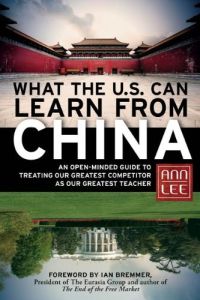Join getAbstract to access the summary!

Join getAbstract to access the summary!
Ann Lee
What the U.S. Can Learn from China
An Open-Minded Guide to Treating Our Greatest Competitor as Our Greatest Teacher
Berrett-Koehler, 2012
What's inside?
China is the new champion of capitalism. Should America do what China does?
Recommendation
In the late 1970s, China first began to open its economy and edge toward capitalism – a process that, perhaps, evolved into a conscious policy direction only when Deng Xiaoping declared in 1992, “To get rich is glorious.” In this transition, China decided not to adopt the West’s approach. Instead, it altered capitalism to fit Chinese culture, traditions and sensibilities. In the interim, China has experienced an “economic miracle,” achieving an outstanding annual growth rate. Meanwhile, the United States faces economic challenges. Therefore, contends economist Ann Lee, the US should change how capitalism works within its borders. She says America could learn from China’s policies, such as its inventive adaptation of capitalism and certain aspects of its governance. A former stock research analyst and now a New York University professor, Lee is a frequent US media commentator. She offers a pessimistic – though sometimes fond – view of the US and the West, and a positive – sometimes excessively so – view of China. (For instance, China does help African nations, as she says, but often in exchange for their natural resources.) Both points of view may seem contrarian to most Westerners, so Lee’s treatise could well be instructive – and she may more candidly reflect beliefs held in China than most US coverage. While always politically neutral, getAbstract suggests her iconoclastic, controversial book to those who are interested in her take on how China’s economy grew, how it works and whether it offers ideas that might benefit the West.
Summary
About the Author
Ann Lee is a finance and economics professor at New York University; a former visiting professor at Peking University; and a senior fellow at Demos, a public policy think tank.


















Comment on this summary